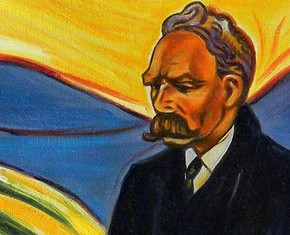The views expressed in our content reflect individual perspectives and do not represent the authoritative views of the Baha'i Faith.
We are what we think.
All that we are arises with our thoughts.
With our thoughts we make the world. – Buddha, the DhammapadaThe veil of substance and worldliness is drawn across the reality of Truth. – Abdu’l-Baha, Abdu’l-Baha in London, p. 56.
What came first: the idea or the reality? I know, it’s kind of a chicken-and-egg question, but give it some thought anyway.
While you’re thinking about it, let’s take a second to figure out the answer to that pesky chicken-and-egg thing. You believe in evolution, right? Well, if Darwin got it right, you know that the chicken evolved from a precursor bird, presumably prehistoric and maybe even related to the avian dinosaurs. That means chickens gradually changed, over time, from what they used to be—a pterodactyl, perhaps—to a modern chicken. If you follow that logic, then it becomes obvious that the egg came first, not the chicken. Why? Because the parents of that egg weren’t really chickens, at least in a scientific sense. They were pre-chickens, evolving pterodactyl ancestors of some type, and their offspring became the first real original proto-chickens. Voila! The eternal question, finally answered!
Enough of that silliness—let’s go back to the idea or the reality question. Realists maintain that reality precedes ideas, and idealists believe the exact opposite, that ideas precede reality.

J.R.R. Tolkien
Realists usually argue that reality limits the scope of our thoughts—that our actual lived experience in the “real” world defines realism. Just as J.R.R. Tolkien did by creating entirely new, imaginary worlds populated with orcs and hobbits, those “new” worlds, realists maintain, have to ground themselves in existing reality and model their construction on something already familiar to the human experience. Realists say we can’t think of something that doesn’t already exist. To a realist, reality exists first, and we model our ideas on it.
Idealists take the opposite point of view—that we can think of something that doesn’t already exist, and then bring it into existence. To an idealist, the idea (or the ideal) comes first, and the physical reality follows. Just about every religion subscribes to this view, believing that reality appeared first in the mind of God, came to humanity via a messenger or prophet of God, and then became realized in the physical world.
As a test case of this idea vs. reality question, let’s look at human inventions—the smartphone, for instance. A realist would say that smartphones came into being because humanity improvised and improved on what already existed (telephones, computers, etc.). An idealist would say that all human inventions started as an idea first, and then got translated into something real. Somebody, at some point, had to conceptualize the very first idea of a smartphone, and then work to make it real.
The Baha’i teachings suggest that this idealistic point of view more accurately reflects the truth; and that the human spirit serves as the intermediary between the ideal and the real:
The spirit of man is a circumambient power that encompasseth the realities of all things. Whatsoever thou dost see about thee — wondrous products of human workmanship, inventions, discoveries and like evidences — each one of these was once a secret hidden away in the realm of the unknown. The human spirit laid that secret bare, and drew it forth from the unseen into the visible world. There is, for example, the power of steam, and photography and the phonograph, and wireless telegraphy, and advances in mathematics: each and every one of these was once a mystery, a closely guarded secret, yet the human spirit unravelled these secrets and brought them out of the invisible into the light of day. Thus is it clear that the human spirit is an all-encompassing power that exerteth its dominion over the inner essences of all created things, uncovering the well kept mysteries of the phenomenal world. – Abdu’l-Baha, Selections from the Writings of Abdu’l-Baha, p. 169.
If you think about the history of human discoveries and inventions—steam, electricity, the internal combustion engine, the airplane, computers, etc., etc.—you’ll understand that designers and engineers and architects and inventors usually conceived of their inventions first, and then worked to bring them to fruition. Sometimes their initial ideas came from necessity—Humphrey Davy invented the first incandescent light bulb in 1802, for example, to prevent explosions caused by open flames in underground mines. Sometimes, though, big new ideas came from dreams, daydreams and fiction, the fruit of an artist’s or an inventor’s pure inspiration.
For example: Simon Lake, the inventor and builder of the first submarine, The Argonaut, took his inspiration from Jules Verne’s 1870 novel Twenty Thousand Leagues under the Sea, and Verne’s fictitious undersea ship The Nautilus.
Idealists, then, don’t just believe in the power of an ideal—they understand that ideas themselves fuel invention, progress and the forward movement of human civilization.
Every scientist, artist, explorer, astronaut and inventor is an idealist. They each look into the future and see something new, something useful, something that will advance civilization and help humanity, and then they figure out a way to make their idea a reality. Their visionary ideas—and their idealism—carry humanity forward.
You May Also Like
Comments

















It may be said that Ideas (the Word) are pre-existent and only become physically manifested through the vehicle of the mind of man, individually or collectively.
"Just about every religion subscribes to this view, believing that reality appeared first in the mind of God, came to humanity via a messenger or prophet of God, and then became realized in the physical world." As a scientifically oriented person, I see it differently. For me, reality appeared first in the mind of God, became realized in the physical world, and then came to ...humanity via a messenger or prophet of God. I don't see any contradiction between this view and Baha'i teachings, or the teachings of most other religions.